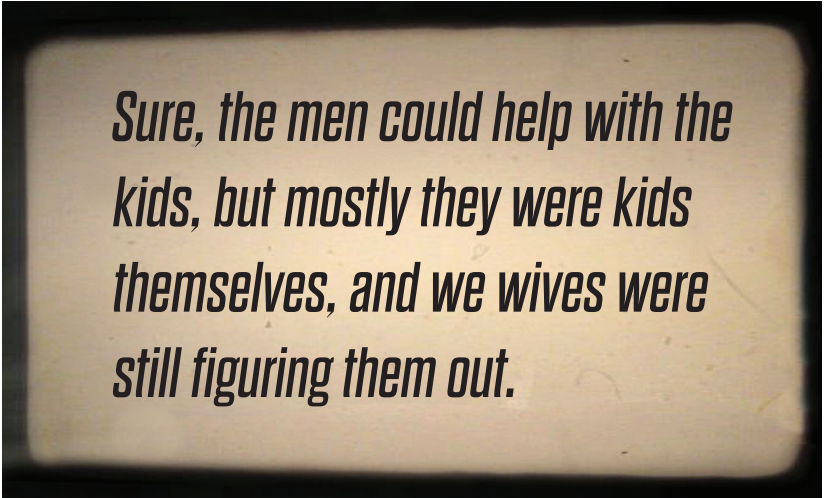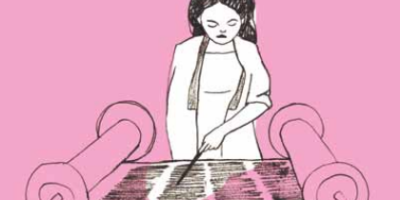
Fiction: Men Make Plans
At the end of World War II the men who’d made it through were pouring back home. They had whipped the Nazis and Japs, but left a lot of buddies dead on the battlefields. Brimming with plans and hungry for life,
new American life, they wanted to start families. In 1950 my husband Jake and I bought the East 26th Street house in Brooklyn for $13,000 on the GI Bill. That was part of my plan. A solid brick two-family meant there would always be rent coming in; and Jake, an auto mechanic and ex-Marine, could fix anything that broke. And, he and his brother were partners in a gas station, just when Detroit was churning out millions of cars. Jake would say, “Ruthie, I’ll be a millionaire by the time I’m 40!” I always laughed, but some part of me thought, “Why not?” We were so hopeful. Later, much later, a lesson from my grandmother years before came to haunt me—der mensch tracht un Gott lacht; men make plans, God laughs. But that is the end of the story, isn’t it?
Within a year we had made ourselves a home, with wall-to-wall carpeting and a TV in the living room. The street was full of kids, carriages, bicycles, Buicks, the stuff of the American dream. Our boy, nicknamed Itchie, was seven and loved school; our daughter Miri was five and eagerly starting kindergarten. I was trying for Jennie, though she took a few more years.
Before long Jake’s brothers bought big private houses across the street, and my sister closed on a fixer-upper around the corner on East 27th. We were a little village, a shtetl in America. My cousin Marion also bought on East 27th, and I was glad. We had grown close during the war; I had even met her boyfriend Paul before anyone knew they were an item. I was shocked that she’d found someone up to her standards. I loved her, but what a snob she was; no auto mechanic for her, excuse me! But Paul must have been elegant enough. They had a whirlwind courtship, and it was obviously a match. Marion was educated, cultured. She read, not just magazines but piles of books; went to museums and the symphony, and flaunted it. And Paul, with the ascots he wore, and the pipes he smoked, also came off like an aristocrat. But for every pot there’s a lid, right? They were happy with each other.
Marion loved my kids, and always brought them gifts. She wanted a baby, too, but gornisht, it wasn’t happening. Meanwhile, she taught English at the community college, and took psychology classes at night; Paul worked a city desk job. Marion was no beauty, but she was striking, with her straight nose and sharp cheekbones, shoulder-length hair pinned at one side with a tortoise shell comb. She had a habit of refastening the comb, twisting it with one hand and dramatically tossing her head. Paul wore fitted jackets and those ascots, and always with the pipe. Aloof. When they walked into a group of neighbors or even family, the room got chilly as people sized them up. Paul traveled with a newspaper tucked under his arm; instead of kibbitzing with the other men he would settle into an easy chair, light his pipe, and snap open the paper.
One quiet Saturday, Marion came to visit. Instead of pausing in the doorway to toss her hair and show off the kids’ presents, she collapsed through the door crying, a crumpled hankie pressed to her eyes.
“Ruthie,” she said, “It’s Paul.”
My heart jumped. “He’s sick? Oh my God.”
“No, no,” said Marion, trying to calm her shuddering sobs. “Anyway, I don’t think so.” She wiped her eyes. “It’s just, he can’t—he doesn’t—”
I reached across the table, folding my hand over hers. “It’s all right, nu, it’s okay. What is it?”
She took two deep breaths.
“Tell me,” I said.
She searched my eyes for whatever it is that lets a person trust another. I held her gaze, knowing she would find that; for all my shortcomings, I am a person who can be trusted.
She sighed. “It started on our honeymoon.”
I held up my hand to quiet her, and peeked at my little Miri curled in the big living room armchair, reading. Was she listening? But with that child, once she was buried in a book dynamite wouldn’t move her.
“It’s okay. She’s oblivious.”
She went on. “Of course I depended on him to know, to know his way around. Didn’t you? With Jacob?”
“Yes, of course!” I said, “Even if I knew something, I would never want him to know!”
Marion nodded enthusiastically. “Exactly! And anyway, I didn’t know anything, and Paul did! He waited for me in bed, silk pajamas, suave as could be, it was like a dream…”
“When I came out of the bathroom in my negligee he opened his arms and, you know, I let the robe slip off my shoulders like in the movies, and got under the covers. Everything was good, beautiful—the kissing, embracing, whispering and sighing, so close.”
“Yes,” I said, remembering my first time with Jake.
“But then…he was ready. Even though I didn’t know much, I knew that. He was, you know, hard. It was a little frightening, I didn’t know what to expect.” She looked at me, then away, her voice dropping. “And if it would hurt.” She lowered her voice. “Then he, I don’t know, he couldn’t keep it. I realized he was nervous, and of course I was too. ‘Let’s give it a rest for tonight,’ he said, as if it was just like, a temporary malfunction.” She shook her head, remembering.
“So, there we were, in our beautiful room at the Waldorf. Bride and groom but not really man and wife.”
I leaned in, squeezing her hand, swallowing my envy. The Waldorf! My honeymoon with Jake was one night at a Lakewood, New Jersey hotel. On the one hand. On the other hand, Jake got me pregnant first time at bat. Marion would have traded places with me in a minute.
“It went on like that for weeks, months.” She put her hands over her face. “Ruthie, I’ve tried music, candlelight, cocktails with dinner.” She blushed. “Racy lingerie. Weekend getaways. But now he won’t even go, too much pressure.”
She looked at me, tears starting again. “We don’t try anymore. He’s so embarrassed he pretends to fall asleep on the couch.”
Believe me, I had no such problems. If anything—well, Jacob was a normal, extremely healthy male, if you know what I’m saying.
I thought about Kinsey, all the rage; I had only read an article in Pageant magazine, but Marion had read the actual book. The statistics showing young couples were having sex at least twice a week made her feel worse.
I hesitated, afraid of my own thoughts, but trying to be honest.
“Could he be—you know, a feygeleh?”
“NO!” she cried. “He’s not homosexual, I’m pretty sure. He just can’t…finish.”
I poured us tea, adding a little schnapps to Marion’s.
“Ruth, I can’t say any more to him. It’s so awkward, the words won’t even come.”
We sat in the kitchen, squares of sunlight creeping across the linoleum, marking the hours as we talked. It got late.
Rising to leave, she said, “Promise you’ll keep this quiet?”
“Of course. And I’ll think about it. Really.”
I did think, and I didn’t tell. Everything changed, but not because of anything I did. Okay, maybe one of Marion’s psychology teachers would disagree; maybe my unconscious was at work, thank you, Dr. Freud.
Nina Toscano rang the bell. “Ruthie!” she called, “We’re having everyone over Saturday. Bring that handsome husband!”
Nina and Tony Toscano lived down 26th Street—younger than us, but their twins Lulu and Tony Jr. were Itchie’s age. We were all friendly, and people would have cocktail parties—drinks, hors d’oeuvres, get a babysitter and head to the neighbors.
Nina was a bleached blonde with a thick Brooklyn accent—dese, dem, dose, for real. Somewhere along the line she’d gotten her nose busted, and she seemed like a tough cookie. But she was actually sweet. Her kids did run wild by 26th Street standards, Lulu already sneaking her mother’s makeup, Tony Jr. dodging traffic on a stripped down bike. It was Nina’s fault, sorry to say. Women’s job was raising the children, along with keeping house and looking good for our husbands. Sure, the men could help with the kids, but mostly they were kids themselves, and we wives were still figuring them out. Some seemed like strangers, and some were shell-shocked—battle fatigued. Marriage could be complicated.
Not so much for me; Jacob and I just had the occasional argument. At first I figured it was the same for everyone. But once in a while after we’d fought, I wondered if some couples were like the ones in the TV families, moms so patient, dads so wise. Once I complained to Jake that Jerry and Caroline next door had such a peaceful relationship; couldn’t we be like them?
“Peaceful, huh?” Jake shook a fist at me. “See this? That’s what Caroline gets whenever she opens her mouth. That guy wakes up screaming every night, and he’s got to take it out on someone.” I watched Caroline more carefully, spotting the heavy makeup under her eyes. I noticed the men disappearing into their thoughts, going far away and chewing the insides of their cheeks, their wives nervous as cats. I counted my blessings and shut up.

Anyway, most women on the block liked Nina; she was generous and funny. We overlooked her kids’ behavior. Her husband Tony was short, but darkly handsome, a sharp dresser in black polos and gleaming shoes, perfectly creased trousers. You might take him for a bookie or a second-string mob guy; but in fact, he was a teller at the Roosevelt Bank on Nostrand Avenue. For a Roosevelt ballpoint pen or calendar, he was your man. He liked to call himself a banker. Now, most of the men on the block were mechanics, carpenters, plumbers, or maybe partners with family in dry cleaning or hardware. They weren’t worldly. But they got the difference between a banker and a bank teller. Still, people were generous. You want to be a banker? Go right ahead.
Nina had a figure like a pinup. Seeing her in everyday snap-front housedresses and worn scuffs, you wouldn’t know it. But we knew, because Tony’s hobby was taking pictures of her. He bought a decent camera, then a lighting kit and white backdrop. Nina became his model. Cocktail dresses with stiletto pumps, wide black hats and long gloves. Then bathing suits with net stockings. Soon he was posing her bare-breasted, in black half-slips or crinolines, legs demurely tucked under her. Her face was always turned slightly away from the camera, to hide that broken nose. Or maybe she was modest.
Tony made albums of these photos, and when the neighbors gathered at their place he displayed them on the coffee table. Nina was truly a knockout. I’m not sure what she felt about it. I asked her once and she shrugged, lighting a cigarette and blowing the smoke out sideways.
“Hey, I won’t be a bombshell forever,” she said. She seemed embarrassed, but also proud. Or defiant. I never asked her again.
How did the rest of us feel? It made some women uncomfortable; it was vulgar. But, it was Nina. We knew her, we liked her. And we were right there with our husbands—better than having them go behind our backs.
The night of Nina’s party I asked if I could bring Marion and Paul. They weren’t going out much and I felt sorry for them. Jacob was upset. Paul was not a regular guy; Jake was afraid of how he would react to Nina’s pictures, since they even embarrassed him a little. He didn’t want to be responsible for throwing cold water on the gathering. But they came.
Nina was serving hors d’oeuvres and ladies’ cocktails, Tony was pouring scotch for the men, everyone was loose. Even Paul had a few drinks. He wasn’t exactly relaxed but at least he’d left his newspaper home. He wouldn’t look at Nina’s albums, but whenever someone leafed through them his eyes slid over to the
turning pages.
“That goddamn Thomson, there goes the series,” said Jerry from next door. “Knocked the Dodgers right on their asses.”
“Ah, they never should’ve put Branca in,” Tony said, picking up the bottle. “Everyone good? Paul?”
Paul held out his glass. “Sure,” he said. I shot Marion a glance; I knew Paul wasn’t a drinker.
We heard a clattering as Tony wheeled in a rickety metal kitchen cart holding a film projector. He tacked a sheet to the wall, turned out the lights, and before we knew it we were watching a blue movie. It wasn’t much—a housewife, a traveling salesman. A little speeded up, it seemed almost funny, jerky and unreal. She was in her bra and panties. He guided her hand to his privates, grasped her fingers and helped her jerk him off. They maybe ended up in bed but nothing, you know, explicit.
Still, the women headed for the kitchen before another film began; it seemed proper. We made small talk, listening for the whirring of the projector. We figured we’d go back in when the lights went on.
Suddenly Paul swooped into the kitchen and grabbed Marion’s arm.
“Let’s go,” he said, practically choking as he spoke.
“Paul—”
Marion was blushing furiously. She refastened her hair twice, looked at me with wide eyes. She wanted help, but I didn’t know what to say. It was obvious: Paul was offended beyond words.
“My sweater,” said Marion, gesturing to the other room.
“Get it tomorrow,” Paul said in that strangled voice, hustling her toward the door.
“Paul, please,” she whispered.
“MARION,” he shouted. Then he hissed. “I said we have to go.”
A hush fell over us. The door closed behind them, and Nina said, “Christ, that was weird.”
In the other room the lights clicked on. My Jacob’s head appeared in the kitchen doorway.
“Everything okay here? Did Paul just come through? He bolted like he was going to be sick.” He squinted in the bright kitchen fluorescent. “Wait, where’s the duke and duchess?” That’s what he called Paul and Marion behind their backs. I could see he was slightly sloshed.
“They left,” I said. “Paul wanted to leave.”
He wagged a wobbly finger at me. “I knew this was a bad idea, my little wifey.”
“Go.” I said. “Sit down before you fall down.”
“Come with me,” he said, with a sloppy smile. I turned to the other women.
“Should we go back? Seems quiet enough.”
We moved toward our husbands. Jerry slid down, his head in Caroline’s lap. Nina scooched into a big armchair, with Tony behind her nuzzling her neck, laughing as she slapped him away. I leaned my head on Jake’s shoulder. Two other couples sat cuddling side by side.
Jerry said, “What the hell happened? I guess he didn’t like that film.”
“It’s nothing, it wasn’t terrible,” I said. “Paul is, you know, he has high standards.”
“Standards, huh?” said Tony, “not like the rest of us slobs!” He was threading the projector with another film. I looked over at Caroline and Nina, who were nervous, too. But then Popeye was on the screen, drooling over a dancing Betty Boop. With nothing on but a hula skirt and a Hawaiian lei that barely covered her boobs, it wasn’t all innocent. But it was a cartoon; our kids watched Betty Boop on Saturday morning TV. We settled down, drowsing in the dim light and giggling at the grainy old animation.
Three months later Marion broadcast the news: she was pregnant. It was a juicy item for everyone who had been at Nina and Tony’s, a clue to why Paul had dragged Marion out of the party.
For their part, they stayed away from 26th Street.
Later that year Marion gave birth to their son. She adored that baby—my God, she never took her eyes off him. But she was having a hard time. Once, just once, she confided in me that she couldn’t shake the memory of that night on East 26th Street, when Tony’s pictures of Nina and, of all things, a stag film, had made her child possible. It was like a stain that she couldn’t erase.
If you ask me, what’s the difference? Life is life; you grab what you can. You think you know so much, but as my grandmother said, der mensch tracht un Gott lacht: men make plans, God laughs. All those plans. But did it do me, or any of us, any good?
Ask Nina. Little Tony ended up in jail, and Lulu had a baby at 16, living in Nina’s basement until they all moved to Florida. Ask Caroline, who finally left Jerry, the hopeless drunk who couldn’t stop beating her up. Or ask poor Marion, or rather Paul; Marion couldn’t speak, or hear, or anything. Hit by a car, she stayed on life support, a vegetable in a nursing home until she died. Every week Paul brought her boy to visit, and read aloud newspaper articles on the off chance she could hear him.
And me? My darling son Itchie died of leukemia; he was just twenty nine.
I think back on those years, how young we were, with everything ahead of us. We had all survived the war, beat the odds.
Lucky, or so we thought. But men make plans…
I think about that darkened room, leaning into each other with the cartoon light flickering on our sleepy faces. We never heard God laughing.
Alice Shechter was born, raised and still lives in Brooklyn, the backdrop for many of her short stories and most memories.






